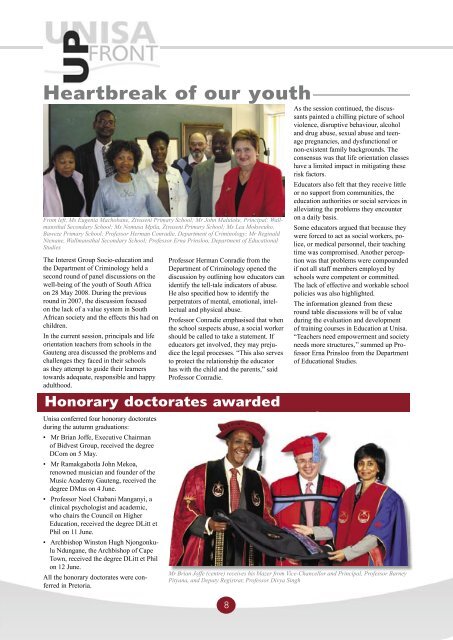Unisa community has heart of gold - University of South Africa
Unisa community has heart of gold - University of South Africa
Unisa community has heart of gold - University of South Africa
Create successful ePaper yourself
Turn your PDF publications into a flip-book with our unique Google optimized e-Paper software.
Heartbreak <strong>of</strong> our youth<br />
From left, Ms Eugenia Machobane, Zivuseni Primary School; Mr John Maluleke, Principal: Wallmansthal<br />
Secondary School; Ms Nomusa Mpila, Zivuseni Primary School; Ms Lea Mokweuho,<br />
Baweze Primary School; Pr<strong>of</strong>essor Herman Conradie, Department <strong>of</strong> Criminology; Mr Reginald<br />
Ntenane, Wallmansthal Secondary School; Pr<strong>of</strong>essor Erna Prinsloo, Department <strong>of</strong> Educational<br />
Studies<br />
The Interest Group Socio-education and<br />
the Department <strong>of</strong> Criminology held a<br />
second round <strong>of</strong> panel discussions on the<br />
well-being <strong>of</strong> the youth <strong>of</strong> <strong>South</strong> <strong>Africa</strong><br />
on 28 May 2008. During the previous<br />
round in 2007, the discussion focused<br />
on the lack <strong>of</strong> a value system in <strong>South</strong><br />
<strong>Africa</strong>n society and the effects this had on<br />
children.<br />
In the current session, principals and life<br />
orientation teachers from schools in the<br />
Gauteng area discussed the problems and<br />
challenges they faced in their schools<br />
as they attempt to guide their learners<br />
towards adequate, responsible and happy<br />
adulthood.<br />
Pr<strong>of</strong>essor Herman Conradie from the<br />
Department <strong>of</strong> Criminology opened the<br />
discussion by outlining how educators can<br />
identify the tell-tale indicators <strong>of</strong> abuse.<br />
He also specified how to identify the<br />
perpetrators <strong>of</strong> mental, emotional, intellectual<br />
and physical abuse.<br />
Pr<strong>of</strong>essor Conradie emp<strong>has</strong>ised that when<br />
the school suspects abuse, a social worker<br />
should be called to take a statement. If<br />
educators get involved, they may prejudice<br />
the legal processes. “This also serves<br />
to protect the relationship the educator<br />
<strong>has</strong> with the child and the parents,” said<br />
Pr<strong>of</strong>essor Conradie.<br />
Honorary doctorates awarded<br />
<strong>Unisa</strong> conferred four honorary doctorates<br />
during the autumn graduations:<br />
• Mr Brian J<strong>of</strong>fe, Executive Chairman<br />
<strong>of</strong> Bidvest Group, received the degree<br />
DCom on 5 May.<br />
• Mr Ramakgabotla John Mekoa,<br />
renowned musician and founder <strong>of</strong> the<br />
Music Academy Gauteng, received the<br />
degree DMus on 4 June.<br />
• Pr<strong>of</strong>essor Noel Chabani Manganyi, a<br />
clinical psychologist and academic,<br />
who chairs the Council on Higher<br />
Education, received the degree DLitt et<br />
Phil on 11 June.<br />
• Archbishop Winston Hugh Njongonkulu<br />
Ndungane, the Archbishop <strong>of</strong> Cape<br />
Town, received the degree DLitt et Phil<br />
on 12 June.<br />
All the honorary doctorates were conferred<br />
in Pretoria.<br />
Mr Brian J<strong>of</strong>fe (centre) receives his blazer from Vice-Chancellor and Principal, Pr<strong>of</strong>essor Barney<br />
Pityana, and Deputy Registrar, Pr<strong>of</strong>essor Divya Singh<br />
8<br />
As the session continued, the discussants<br />
painted a chilling picture <strong>of</strong> school<br />
violence, disruptive behaviour, alcohol<br />
and drug abuse, sexual abuse and teenage<br />
pregnancies, and dysfunctional or<br />
non-existent family backgrounds. The<br />
consensus was that life orientation classes<br />
have a limited impact in mitigating these<br />
risk factors.<br />
Educators also felt that they receive little<br />
or no support from communities, the<br />
education authorities or social services in<br />
alleviating the problems they encounter<br />
on a daily basis.<br />
Some educators argued that because they<br />
were forced to act as social workers, police,<br />
or medical personnel, their teaching<br />
time was compromised. Another perception<br />
was that problems were compounded<br />
if not all staff members employed by<br />
schools were competent or committed.<br />
The lack <strong>of</strong> effective and workable school<br />
policies was also highlighted.<br />
The information gleaned from these<br />
round table discussions will be <strong>of</strong> value<br />
during the evaluation and development<br />
<strong>of</strong> training courses in Education at <strong>Unisa</strong>.<br />
“Teachers need empowerment and society<br />
needs more structures,’’ summed up Pr<strong>of</strong>essor<br />
Erna Prinsloo from the Department<br />
<strong>of</strong> Educational Studies.

















